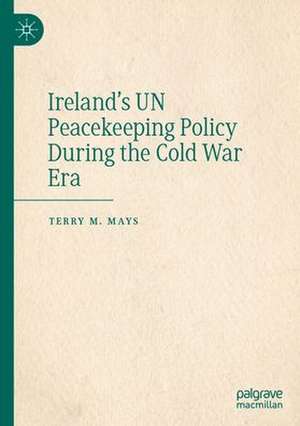Ireland's UN Peacekeeping Policy During the Cold War Era
Autor Terry M. Maysen Limba Engleză Hardback – 30 mai 2023
Preț: 707.21 lei
Preț vechi: 862.45 lei
-18% Nou
Puncte Express: 1061
Preț estimativ în valută:
135.36€ • 141.08$ • 112.68£
135.36€ • 141.08$ • 112.68£
Carte tipărită la comandă
Livrare economică 07-21 ianuarie 25
Preluare comenzi: 021 569.72.76
Specificații
ISBN-13: 9783031327766
ISBN-10: 3031327764
Ilustrații: XI, 240 p. 1 illus.
Dimensiuni: 148 x 210 mm
Greutate: 0.46 kg
Ediția:2023
Editura: Springer Nature Switzerland
Colecția Palgrave Macmillan
Locul publicării:Cham, Switzerland
ISBN-10: 3031327764
Ilustrații: XI, 240 p. 1 illus.
Dimensiuni: 148 x 210 mm
Greutate: 0.46 kg
Ediția:2023
Editura: Springer Nature Switzerland
Colecția Palgrave Macmillan
Locul publicării:Cham, Switzerland
Cuprins
Chapter 1: Introduction: Ireland’s UN Peacekeeping Policy in the Cold War Era.- Chapter 2: Potential Obstacles to an Irish UN Peacekeeping Policy.- Chapter 3: Sinai 1957, Lebanon 1958, and Palestine 1958.- Chapter 4: The Congo 1960.- Chapter 5: Cyprus 1964 and India-Pakistan 1965.- Chapter 6: Sinai 1973.- Chapter 7: Cyprus 1976-1977.- Chapter 8: Lebanon 1978.- Chapter 9: Afghanistan-Pakistan 1988, Iran-Iraq 1988, and Central America 1989.- Chapter 10: Namibia 1989.- Chapter 11: Conclusions at the End of the Cold War.
Notă biografică
Terry M. Mays is Professor of Political Science at The Citadel, USA.
Textul de pe ultima copertă
This is the first book to study the establishment and evolution of an Irish Peacekeeping Policy. The author uses declassified primary source materials released by the Irish National Archives and relies on the notes and discussions of Government and legislative debates to demonstrate how the Irish governmental system operated to make the crucial decisions to dispatch contingents to UN peacekeeping operations. Analysed are: declassified discussion, debate, draft and final memos, and cables between the UN and Irish Government as well as internal to the Irish Government. The author considers the three step process of the political discussions between Ireland and the UN: the coordination between Ireland and other states; the discussions among members of the Irish Government; and the debate within the Irish legislature. Through this the author aims to promote an understanding of the mechanics behind Ireland’s rise in reputation as a major backer and contributor to UN peacekeeping. At the same time, it presents an examination of a unique codified state process related to agreeing to the dispatch of personnel in support of UN peacekeeping.
Terry M. Mays is Professor of Political Science at The Citadel, USA.
Caracteristici
Studies the establishment and evolution of an Irish Peacekeeping Policy Presents an examination of a unique codified state process related to agreeing to the dispatch of personnel Analyzes declassified discussion, debate, draft and final memos, and cables between the UN and Irish Government
